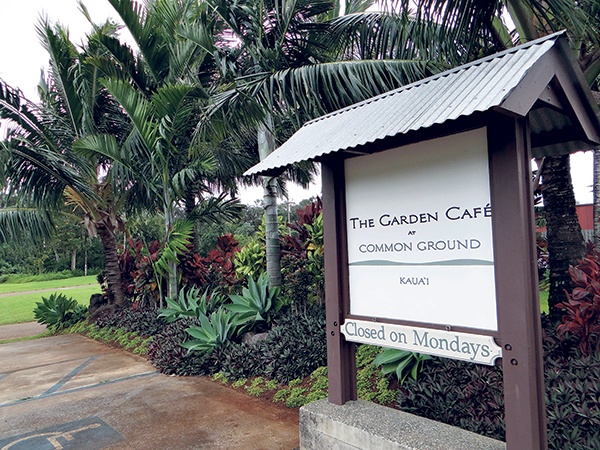Battleground over ‘Common Ground’
KILAUEA — A group of Kilauea neighbors say their voices were ignored when they opposed what they call a bad precedent in allowing extended use and a liquor license on agricultural land.
In April, the County Liquor Control Commission permitted Common Ground Cafe to sell alcohol, provide live entertainment, dancing and extended hours for private parties.
Kilauea residents Mark Leon and Diane Torkelson own the property adjacent to Common Ground. They say the original snack bar permit granted to Guava Kai plantation in 1988 restricted sales to guava-related products and other tropical fruits. The county granted commercial status to a property that is still operating under a 1988 permit to support guava agriculture — and then approved alcohol without answering the existing use permit question, Leon said.
Elli Ward said Common Ground seems to be getting permit upon permit and it doesn’t seem to matter what neighbors say. She said neighbors fear drinking will create problems for the narrow, unlit road.
“I do not see how any reading of that permit and the amendments added last June could possibly be construed to sanction the current operation at Common Ground,” Leon said.
County Planning Director Mike Dahilig stated the sale of alcohol is permissible under the zoning permits as “an accessory to the meal being served.”
C. Brewer & Co. owned the land and operated Guava Kai plantation through subsidiaries Kilauea Agronomics and Hawaii Fruit Specialties. After selling the land in 1996, C. Brewer leased it back to continue orchard operations until 180-year-old C. Brewer was dissolved in 2007.
Christopher Jaeb established the nonprofit Malama Kauai in 2006. He bought 46.59 acres of Guava Kai in 2008, including the visitor center, administration building and snack bar area. The snack bar became The Garden Cafe in 2010, as an extension of the nonprofit’s vision to build self-reliant communities that improve economic, social, environmental and cultural health.
Jaeb stated at a June 2013 meeting of the Kilauea Neighborhood Association that he did not want to serve liquor. A year later, the liquor license application called it a necessity to sell the food products of local growers.
Responding to KNA board member opposition letters, Jaeb called them a minority interest against the community of supporters of his mission.
The letters were sent outside of the board approval process, said KNA President Yoshito L’Hote. Officially, KNA had no position on the applications.
Board members, concerned with complaints of neighbors, sent letters to Planning and the Liquor Commission to state the liquor license is a misuse of the zoning permit.
The liquor permit was appropriate, L’Hote said. Common Ground is attempting to do what the cafe was not able to do on its own.
“Everything should be looked at as an individual case and not as one rule for everybody,” L’Hote said. “If there is a way to help the local farming community and promote produce then, personally, I am in favor of it.”
KNA board member Tim Kallai said Common Ground is a good venue and a healthy option for Kilauea. The liquor license does not transfer and the next owner would have to re-apply from scratch, where the community could present concerns.
KNA board member Mike Latif said any exception to agricultural land policy, no matter how well-intentioned, may be detrimental in the long run as the land changes hands. He said a new landowner might say, “You allowed him to do it so why are you holding me back?”
Common Ground neighbors David and Ellie Ward said the Guava Kai permit was specific in requiring the major activity to be an ag operation with the secondary snack bar. Common Ground is a prop ag operation to justify the restaurant, he said.
“That is not an ag operation by any stretch of the imagination,” David said.
To transfer the permit to Common Ground’s 15-acre parcel of 60 total acres is a stretch. Ward said the county is exercising its authority to zone anything under 15 acres on ag land. It’s like allowing someone to build a steakhouse on ag land because they have three cows grazing in the backyard, he said.
Another neighbor, Michelle Martinez, said the farm-to-table restaurant concept is distorted when a small garden and orchard, and a few sheep and goats, amount to a fraction of the restaurant cuisine.
The property has been for sale nearly the entire time Jaeb has owned it, and neighbors fear the permits changing use will increase value and put it out of reach of small growers. It would only attract those with the ability to capitalize on the permits to further commercialize the property.
KNA board officer Scott Mijares said he spoke recently with his associate, Jaeb.
“The property is no longer for sale,” Mijares said. “He has decided to keep it.”
Martinez said neighbors are learning their complaints must be made with the right departments to be considered at the permit renewal. Otherwise, Common Ground would be able to say there are no complaints.
“No one ever said we had to complain to the planning commission,” she said.

